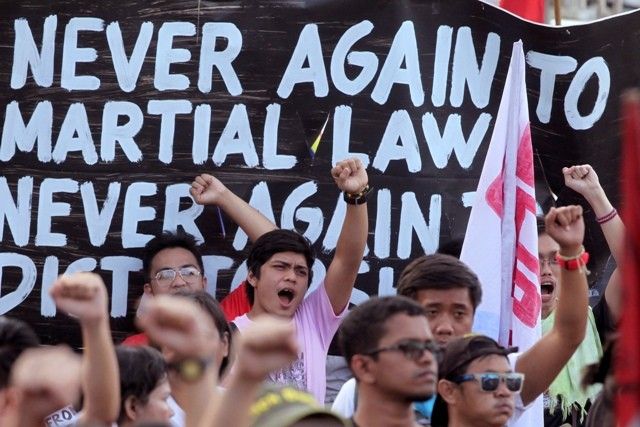Calida to martial law challengers: Proclamation differs from extension

MANILA, Philippines — “The proclamation of martial law is a matter entirely different from its extension.”
That was one of the arguments raised by the government’s top lawyer against petitioners questioning the constitutionality of President Rodrigo Duterte’s “re-extended” martial law powers across the restive southern region of Mindanao.
On May 23, Duterte placed Mindanao under martial law after the principal Islamic city of Marawi was stormed by heavily-armed homegrown extremists who pledged allegiance to ISIS.
In July, Congress overwhelmingly voted to prolong military rule in Mindanao until yearend after the proclamation reached its 60-day constitutional limit, giving Duterte more time to stabilize the strife-torn region where ISIS was gaining influence.
With 240-27 vote at a joint session, it took Congress less than half a day to approve Duterte’s request to extend martial law in Mindanao again until Dec. 31, 2018.
In a 63-page consolidated comment released on Saturday, Solicitor General Jose Calida argued that placing Mindanao under military rule is part of Duterte’s power as president while prolonging such a declaration is the prerogative of Congress.
“It follows that the judicial review of the proclamation of martial law is different from judicial review of the extension,” Calida said.
Four petitioners have asked the Supreme Court for a halt order on the "re-extension" of martial law.
They challenged, among others, the “inordinately long” duration of the prolonged military rule, and the use of such an extraordinary power even as Marawi has been liberated from terrorists.
They also questioned the inclusion of threat posed by the New People's Army, the communists’ armed wing, to justify the extension of martial law.
The petitioners likewise claimed that the two houses of Congress committed grave abuse of discretion when it approved Duterte's request for extension by limiting the period of deliberation and interpellation of invited resource speakers to only three minutes.
READ: What petitioners vs martial law will argue before the Supreme Court
“It should be noted that Marawi is not the entire Mindanao. The liberation of Marawi did not signal the end of the rebellion in the whole of Mindanao,” said the solicitor general.
“Due deference must be made to the judgment call of the President, as it is based on vital, relevant, classified, and live information not ordinarily available to the public,” he added.
“Apart from disregarding the Supreme Court’s earlier ruling, Petitioners also want the Court to believe that communist rebellion is not detrimental to public safety, notwithstanding the numerous attacks made on civilians in the name of the Marxist ideology,” Calida added.
Martial law remains a sensitive issue in the Philippines after it was used by the late dictator Ferdinand Marcos in the 1970s to perpetuate himself to power.
Opponents feared Duterte might declare a nationwide martial law, but his aides had repeatedly dismissed that.
The Supreme Court, on Wednesday, set oral arguments on the petitions at 2 p.m. on January 16 and 10 a.m. on January 17.
Related video:
- Latest
- Trending


























